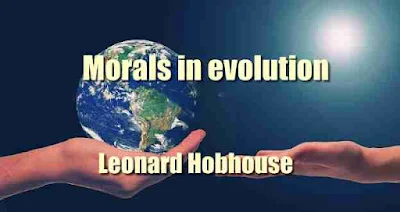Morals in evolution, a study in comparative ethics
 |
| Morals in evolution |
The purpose of the present work is to approach the theory of ethical evolution through a comparative study of rules of conduct and ideals of life. In this branch of evolutionary science theory and fact sometimes tend to fall apart. Hypotheses may be formed by the method of brilliant conjecture without any firm basis in the actual history of the moral consciousness, while that history as revealed in the mass of recorded customs and doctrines concerning conduct sometimes tends to be lost in a mass of anthropological detail wherein it is impossible to see the wood for the trees.
The attempt made in these volumes is to ascertain the main features of development, and by piecing them together to present a sketch in which the essentials of the whole process will be depicted in outline. In this method of handling the subject, no hypothesis as to the causes of evolution is required. Even the hypothesis of evolution itself is not strictly necessary. Our object is to distinguish and classify different forms of ethical ideas — a morphology of ethics comparable to the physical morphology of animals and plants.
The results of such a comparative study, if firmly based on recorded facts, would remain standing if the theory of evolution were shattered. At the same time, here as elsewhere, the results of classification when seen in the light of evolutionary theory acquire a wholly new significance and value. They furnish us with a conception of the trend of human development based not on any assumption as to the underlying causes at work, but on a matter-of-fact comparison of the achievements reached different stages of the process itself. Little, therefore, will be said here of the psychological forces which underlie the ethical consciousness; little of the socio- logical and other factors which accelerate or retard development. These lie for the most part outside our immediate province. It is the essential facts of development itself that we are seeking to ascertain.
Such an inquiry encounters many difficulties of its own. Vast and complex subjects must be handled with a brevity which to one especially interested in them will appear quite inadequate. The conclusions of a hundred specialisms must be used by one who from the nature of the case cannot himself be a specialist in any of them. Hence the openings alike for error of detail and for disproportion of general handling are great. Nor is it possible to avoid subjects of controversy.
For the study of the development, the ethics of civilization are not less, but, if anything, more important than those of savagery, and have therefore received closer attention in this work. But the complexities of civilized ethics, interwoven as they are with religious and political doctrines, can only be treated within the limits of a general sketch by keeping strictly to what is distinctive and fundamental in each system, and of this, only so much is selected for discussion as is deemed to have a bearing on ethical development.
In such selection, the general philosophic bias of the inquirer is only too apt to have an influence. Further, it is a part of the plan of the work to estimate critically the position of each system in the line of ethical development, and in such criticism, it is still harder to put aside all preconceived opinions. The alternative would be to omit the ethics of Christendom and the problems of modem thought altogether. This I felt would make the inquiry, and I have accordingly endeavoured to treat these subjects precisely on the same footing and in the same spirit as others, that is to say, as phases of development to be critically but quite impartially examined. In the sketch of modern philosophy, however,
Contents:
I The Scope And Method Of Comparative Ethics 1
Ii Forms Of Social Organization .... 38
Iii Law And Justice 70
Iv Marriage And The Position Of Women . . 132
V Women In The Civilized World .... 179
Vi The Relations Between Communities . . 233
Vii Class Relations 270
Viii Property And Poverty 318
Summary 354
Part Ii
The Basis
I The Early Phases Of Thought .... 865
Ii Ethical Conceptions In Early Thought. .419
Iii The World And The Spirit 459
the book details :
Download 19.3 MB

